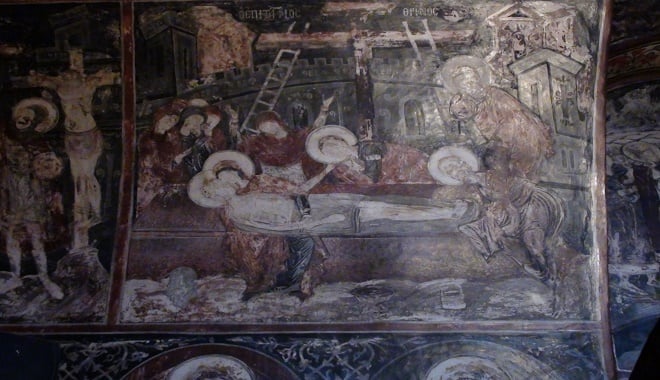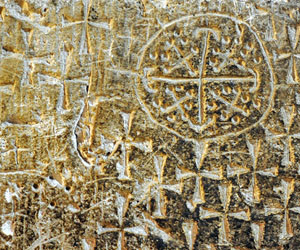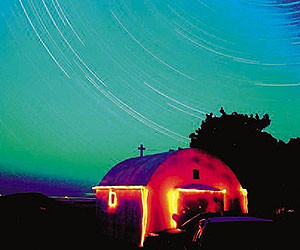A brief journey through the events of Christ’s Crucifixion and Resurrection
15 April 2020All of the events of Holy Week represent an attempt by man, in his freedom to love, to share in the sacrificial love of God, that is to say, the mystery of salvation, by following the rigorous spiritual discipline of the Church. This discipline does not consist in the Pharisaic observance of certain commandments, but is rather ‘a mother of sanctity, from which is born the first experience of perception of the mysteries of Christ’.

Holy Week, the week of Our Lord’s Passion, which reaches a climax on Easter Sunday, the Sunday of Our Lord’s Resurrection, is celebrated by the Church as a Pascha of suffering and victory, and is sung by its vigilant members as a Paschal ode, as a hymn to the one and only true form of freedom, the freedom with which Christ liberated the world. This ode might also be described as a Paschal Song of Songs, which is not composed of spiritual raptures or momentary outbursts of religious sentimentalism but humility and repentance, contrition and tears, yearning and love, hope and joy. By singing the ‘new’ Song of Songs we testify to our truly free, our perfect freedom: our decision to meet and follow the same path as our crucified and resurrected Lord, to be crucified and resurrected with Him, to be glorified and raised henceforward into the Jerusalem on high, into His heavenly Kingdom, since it has already arrived and exists within us. The soul of this ‘New Song’ is the liturgical and hymnographical wealth of the Church, the fruit of its experience of holiness, of its burning love for her Bridegroom, the Bridegroom of all human hearts, of each human heart that meekly and fearfully asks to ‘receive mercy and find grace to help in time of need’.1
The whole of Great Lent serves as a prelude to Holy Week. The sweet and genuine mood of contrition, the manliness and beauty of spiritual discipline, of all the methods and ways of spiritual discipline, prepare the faithful for this end: to venerate the Cross and glorify the Resurrection of Christ. All these things represent an attempt by man, in his freedom to love, to share in the sacrificial love of God, that is to say, the mystery of salvation, by following the rigorous spiritual discipline of the Church.
This discipline does not consist in the Pharisaic observance of certain commandments, but is rather ‘a mother of sanctity, from which is born the first experience of perception of the mysteries of Christ, which is called the first stage of spiritual knowledge. Let no one deceive himself and imagine oracles; an impure soul cannot ascend to a pure kingdom, nor commune with the spirits of the saints. Anoint the beauty of your wisdom with tears and fasting… A little suffering for God’s sake is better than a great work performed without suffering. For suffering willingly borne is a first sign of the proof of faith through love… It was for this reason that the love of the saints for Christ was tested through suffering and not through comforts… For if we really suffer with Christ, we shall also be glorified with Him. The mind cannot share in Christ’s glory unless the body suffers with Him.’2
This explains why the Church, in its wisdom, calls on the faithful to exercise spiritual discipline at the beginning of Holy Week, on Great Monday: so that they can ‘walk, be crucified and live with Christ’.3 ‘Abba Longinos said to Abba Akakios: “A woman knows when she has conceived when her issue of blood ceases. Likewise, the soul knows when it has received the Holy Spirit when the passions flowing down from it cease. So long as it is embroiled in these, how can it boast that it is free of them? Give blood and receive the Spirit”.’4 What does this exhortation to exercise spiritual discipline mean? It means that we cannot share in the gifts and revelations of Christ’s Passion and Resurrection if we do not crucify and transform our own lives, if we do not show spiritual wisdom and bodily restraint, if we do not change and display purity of heart and mind, if we do not put carnal pleasures to death and begin to experience suffering, if we do not vanquish our passions and cultivate the virtues, if we do not lovingly approach the crucified love of the Father. In particular, we are called to set ourselves free from sensual pleasures, from carnal sensations, from the endless demands of the flesh. Only then can we preserve the dignity of our souls, gain our royal freedom and strengthen the nobility of our hearts. The figure of Joseph the All-Comely and the Parable of the Withered Fig Tree remind us that freedom, which is expressed in a marriage of theory and practice, is not merely freedom from evil, sin and carnal pleasure but freedom to do good, to practise virtue and to serve.
However important the performance of good works or the replacement of passions with virtues might be, they cannot match the perfect freedom or perfection that man hopes for. Above all things lies the intense desire of the Lord, His unbearable love and the perfect beauty of His person, the perfecter and perfection of all things. The Parable of the Ten Virgins teaches us that we ought to keep our hearts burning like a new burning bush, to keep them constantly vigilant and ready to welcome the Lord, who may return suddenly at any moment. The faithful are called upon to be in a state of constant watchfulness and readiness, not only during Holy Week but throughout their lives. ‘They should be sober and vigilant, they should sleep because of the weakness of nature but be vigilant for the wealth of love.’5 They should achieve wholeness of character and heart, acquiring a heart intelligent enough to understand all things and pure enough to become a womb of salvation. Everything is a gift from our merciful and compassionate God but only a vigilant heart, a ‘heart wounded with love’6, a heart which rediscovers its wedding garments in order to enter the Bridal Chamber of its Lord, contains these gifts in paradisaical abundance. If we want Christ the Bridegroom to count us among the wise Virgins, to include us in His elect flock, then we should focus our attention on the true spirit of faith, on the virginity of the loving heart, on the freedom of humble holiness. Then we can wait for our Lord not only in the light but also in the darkness, as the Bridegroom who comes in the middle of the night of this world, transforming the night of fear and death into a time of love and rebirth.
All of this transcends any kind of religious legalism or Pharisaic moralism. When we do not approach God, God comes to us. What saves us and restores our loving relationship with God is not our good acts but God’s compassion. The harlot, who is presented as an example worthy of imitation so that we might be reunited in love with our crucified and risen Lord, is a paradox in the thinking of the Gospels, an illogicality in terms of the autonomous ethical code. Ultimately, it is our despair at ourselves and our actions, a confession of our unworthiness and failure, that turns us towards or back to God and His works. ‘The tempest of my sins has drawn me to the depths of despair. But I flee to the sea of Your mercy: O Lord, save me!’7 It is God’s mercy that vanquishes all sin; it is man’s love that is stronger than any sin; it is the virginity of the heart, superior to the prostitution of the body, that reopens the gates of Paradise for deceived man. Man is not what he says or does but the yearning and depths of his heart, what he has been called upon to be or to become in his repentance, which is his only dignity, freedom and hope when everything is played out between repentance and impenitence, the only sin, despair and the Devil himself. ‘Who can trace out the multitude of my sins or the depths of thy judgements, Saviour of souls, my Saviour? Disregard me not, thy handmaid, O thou that beyond measure art merciful.’8
It is particularly revealing how the Church has created four important ‘stations’* in the middle of Holy Week to provide us with the spiritual strength that we need to be able to endure the redemptive suffering of Christ’s Passion, crucifixion and death. The recollection of Christ washing His disciples’ feet is a challenge to be humble, for it is ultimately humility that leads to repentance and gives us the strength to serve. This is chiefly because the mysteries, the ever ‘fearful mysteries’ of God, the New World or the Kingdom, as the mysteries of Christ, are revealed to those who are humble in mind and heart, those to whom He entrusts His preaching and ministries. The impartation of the ‘fearful mysteries’, of the mystery of the Divine Eucharist and Communion, before the Passion and the Resurrection provided a foretaste of and an immediate sense of involvement in the Passion and the Resurrection, and was intended to strengthen the faith of the disciples and, by extension, all believers. In a word, it is the mystery of the Church, the mystery, to be precise, of our communion with Christ and all His brothers even unto death, in which death becomes a prelude to the Resurrection. This is also the aim of the ‘supreme prayer’ of Christ in the Garden of Gethsemane: so that we might remain united with the Lord and with each other during His Passion and Crucifixion, during the scandalous events of God’s death and the temptation of faith; so that we might increase our love and lead it to its proper end, rejecting and abhorring the ‘betrayal of the disciple’ Judas, who confused truth with interest, ‘appreciating only what was useful to him’.9 Here it is worth mentioning the ‘dialectic’ that develops between the harlot and Judas: a dialectic between wisdom and folly, love of one’s fellow men and love of money; devotion and denial, witness and betrayal.
These four ‘stations’, then, constitute a call to the faithful to spiritually prepare themselves for and actively participate in the Passion and death of Christ, a Passion and death that bring new life, that conceal the power and freedom of the Resurrection. No action or revelation by God in the world can take place or bear fruit without man’s freedom to respond and his active participation; it cannot be an act of magic or force imposed on men with fearful or insensible hearts. Here we are dealing with events of an utterly extraordinary or wondrous nature. The Passion and death of Christ were not the end of an innocent man or idealist, nor of course the result of human violence or historical necessity. They were the Passion and death of God, the Creator and Saviour, who did away with the passion and death of man, and became a source of faith and love, repentance and freedom, salvation and life. This means a miracle: the paradox of the omnipotence of love, the glory of the omnipotent weakness, the inexplicable phenomenon of the candid silence of a God who endures and does not dominate, who suffers and does not rule imperiously. This is why the Cross, which is the culmination of the Passion and the confirmation of Christ’s death, has always been a great mystery and miracle, as well as a folly and scandal for religion and philosophy as the latter disregard the fact that the glory of His kingdom is proclaimed through death, death on a cross, and the power of His divinity is made manifest by love, a love which is ‘as strong as death’.10
Only those who revere the Lord’s Cross, those who are immersed in the profundity of the mystery, such as the grateful thief who cried out ‘Lord, remember me when you come into your kingdom’11, can confess Christ’s divinity and share in its power. Such individuals can henceforward partake of the eschatological gifts of the Cross, and, what is more, of the grace of repentance and remorse, of forgiveness and love, for the kingdom of God that the thief yearned for in admitting his crimes is the kingdom of the Son of love, with whose love ‘Paradise was opened to us and the way up to heaven was made manifest to all’.12 Paradise or the Kingdom that Christ promised the thief are the Paradise or the Kingdom of forgiveness and love: ‘Do you think that there is only room for you in the Kingdom of Heaven? Do you think that the joy of Paradise has been prepared only for you because there is no salvation for the majority? Well, do not scorn the works that are the fruit of pure divine love and do not give up the good works of a man who orders his life according to God’s will for the disgrace and ruin of a grievous sinfulness’.13 The Cross of Christ is the unity of all things in one unique form of love, the love that unites everything that was formerly sundered and divided by the deceit of the misanthropic and God-hating Devil. The cry uttered by many, ‘Come down from the cross if you are the Son of God!’14, is of purely satanic inspiration for the Cross does not represent the victory of the forces of Satan over Christ but the triumph of Christ over the forces of Satan and all their works. ‘Having disarmed the powers and authorities, he (Christ) made a public spectacle of them, triumphing over them by the cross.’15
The Church extols the example of the penitent thief, emphasising the fact that we are all crucified thieves, hanging either to the right or to the left of the Crucified Christ. Of course, this fact alone cannot save us. Whether we enter Paradise or the Kingdom of Heaven or not does not depend on whether our behaviour is good or bad in ethical terms but hinges, as we have already noted, on how repentant or unrepentant we are. Our return from a life of exile in this barren world to a paradisiacal existence in the future Kingdom is Christ’s reward to us for showing a humble faith, a faith which chooses the way of repentance through a sense of the wrongs we have committed and also complete faith in God. If unrepentance can be identified with despair and the Devil, repentance, which gives us hope and immortality, is the work of Christ. A work that restores man to his original freedom and beauty, a work whose impact is felt not only over all the earth but also in the underworld, a work that is preached in Hell to the men who suffer there and, in the awareness of their torment, long for God’s Paradise. This is the unfathomable depth of the Divine Economy. Christ dies and is buried, and descends to the dark abysmal depths of Hell in order to embrace in His glory the whole of our human nature, which has been corrupted by sin and disfigured by death. The incarnate presence of Christ, in its emptying of the graves of Hell, fills the whole of Creation, and embraces the whole of man’s problem, his life and death, so that we, now and always, may triumphantly sing, in the morning light of blessed Holy Saturday, a day of rest, of salvation, a day for Creation and its creatures: ‘Let creation rejoice, let all born of earth be glad; for Hell, the enemy, has been despoiled… for I am redeeming Adam and Eve with all their race, and on the third day I shall rise again’.16
Now we can look forward to our resurrection from the dead, celebrating Christ’s resurrection from the dead, as He had promised us. Now we can celebrate the dawning of a new, eternal and unending eighth day of Creation, which is prescribed by ‘the ineffable mystery of the existence of created beings in a state of eternal bliss’17, now we can celebrate our rest after an arduous journey, on the Holy and Great Sunday of Pascha, celebrating the ‘life-giving Resurrection of our Lord and God and Saviour Jesus Christ’. For the mourning of the Cross is not the end but the joy of the Resurrection, although of course it should not be forgotten that these two mysteries form an indivisible unity, the most central element of the Christian faith and the life of the Church. The risen Lord ‘snatched the whole of the human race from the depths of Hell, raised it to Heaven and restored it to its original state of incorruptibility’.18 Christ’s work does not constitute a great civilisation but a new Creation; it is not a perfect religion but a new life. In His resurrection ‘we celebrate the death of death, the beginning of another, eternal life’.19 The Liturgy of the Resurrection, together with every celebration of the Divine Liturgy, which is always resurrectional in spirit, is a ‘banquet’ of grace and joy; of joy at Christ’s triumph over death, for this is the Church’s eternal joy, the joy that it experiences as liberation from death and ‘him who holds the power of death – that is, the devil’.20 This joy is proclaimed in the Paschal greeting ‘Christ is risen!’. The Resurrection is the power behind the mystery of the new world and the new man, the beginning of the age of spiritual freedom and the certainty of the deification of all things, which is the reason why all things were created.
Now that our journey through the events of Christ’s Crucifixion and Resurrection has come to an end, let us give thanks ‘again and again’ to our incarnate and suffering Lord, our crucified and risen Lord, our only Creator and Saviour, for His great and passionate love, on account of which He does not abandon His Church and does not – which is the most amazing thing of all – reject those sinners who, out of an intense and unbearable love, dare to make the painful journey to meet Him and worship Him. Meeting with Him is our certain hope during the particularly blessed time of Great Lent, which culminates in Holy Week and Easter Sunday. We can begin this journey today by following the secret and mystic paths carved out for us by the incarnate Christ so that God’s descending love might meet with the ascending love of man, so that in love and through love we might see God’s face and hear His voice, so that we might learn to wait for Him in our sin, which breeds death and our own hell, which is much more fearful than death. How loudly the hearts of we sinners who are exiles from Paradise and wander throughout this barren world echo with the response that the Risen Christ gave to the supplications of St. Silouan the Athonite: ‘Keep your mind in Hell, and despair not’.21 ‘Today’ each one of us can, together with all repentant sinners, bless his crucified and risen Lord for His great and abundant mercy, as is performed in the offices of His crucified and risen Body, the Church.
TRANSLATOR’S NOTE
* These four ‘stations’ consist of Christ’s washing of His disciples’ feet, the institution of the Holy Eucharist, the ‘Supreme Prayer’ of Christ in the Garden of Gethsemane and Christ’s betrayal by His disciple Judas.










